Senator
In Senator, as an influential senator, you will try, obviously, to defend your family, get more power in the Senate and protect Rome. Actually, it is much more than that - you'll covet the title of Caesar, and try to become Rome's newest emperor.
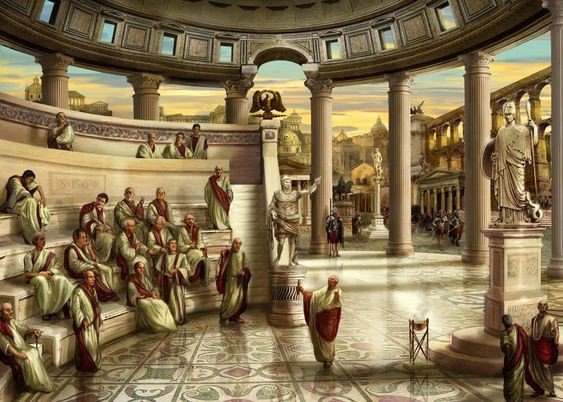
Senator is a political game about ancient Rome, in which treason, economic troubles, uprisings, plagues and wars, besides Rome's natural enemies, hang on players' shoulders, influencing their actions in the Senate. The Roman Republic was a troubled, dangerous place.
The greatest question is: as you try to become the emperor, will you risk your own republic?
“Cowards die many times before their deaths.”
- Julius Caesar, Shakespeare
Game Data
Senator is a game played with 3 to 5 players, for ages 8 and up, by Eric M. Lang, the game designer. The artwork was created by Anders Finér, Ted Galaday and Scott Keating. Senator was released in 2004 by Fantasy Flight Games, which is renowned for its excellent games and even better game components. The mechanic in this game basically involves hand management.
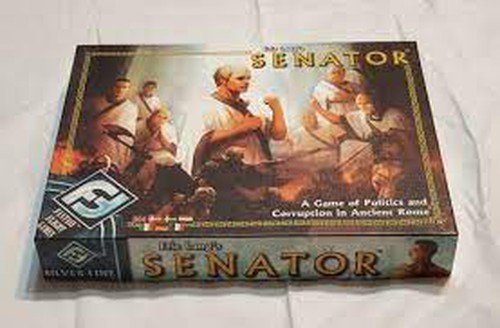
Its designer, Eric M. Lang, is also responsible for other excellent games, such as: Ankh, Bloodborne, Marvel United and the card game versions of Call of Cthullu and A Game of Thrones.
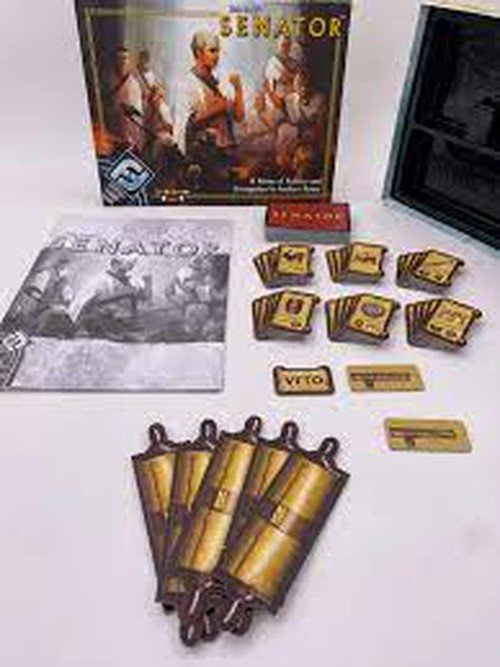
The artists, Anders Finér, Ted Galaday and Scott Keating, haven't stayed behind, and are responsible for the artwork in games like: Magic: The Gathering, Legend of the Five Rings, Mansions of Madness, Eldritch Horror and Arkan Horror.
Now, imagine all of these folks together. Only good things could come out of it, and they have: Senator!
The Game
One Senator turn is full of surprises, expectations and bluffs. The whole game is played in 3 turns and each turn has 3 phases. Let's see them!
Prep Phase
All Agendas have to be shuffled properly and facing down; that comprises the Dock. So, according to the number of players, we get a few Agendas, the 2 Consul tokens and the Veto token, and that will form the Schedule, which means, what will be discussed in the Senate.
Now, this is when the game gets interesting - if there were no disasters, it wouldn't be the Roman senate. Before the turn begins, an Event card is drawn randomly, which means, something will interfere with the voting and each Agenda Debate this turn.
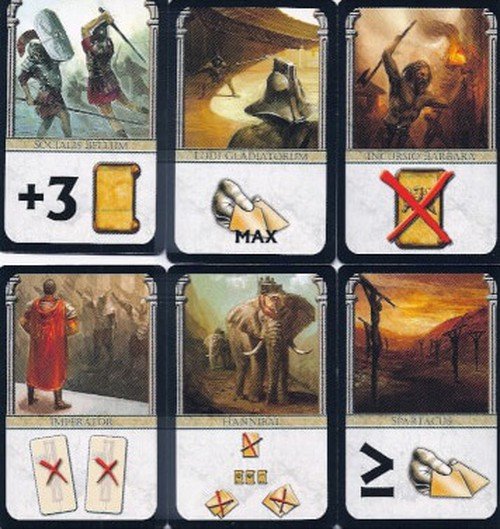
Many bad things can happen with these Events: you, even losing the vote in the Senate, can lose your Influence Cards, important Agendas with more important themes may not be available for voting, Consuls could be forbidden from helping you, and so on and so forth, only disasters. In the Senate, when it's time to debate the Agendas on the Schedule, you'll only face problems - after all, we're in the Roman Senate.
That being said, even with issues, if the Schedule is ready with your Events, it's time to Debate.
Debate Phase
The Debate Phase is the core of this game. The first player will choose which Agenda will be voted, all that strategically, as there are many things in play: Events, conflicting Agendas, voting power (Influence Cards), and so on and so forth. Knowing which is the best Agenda for each moment, according to the Events and your voting power, makes all the difference in the world in Senator.
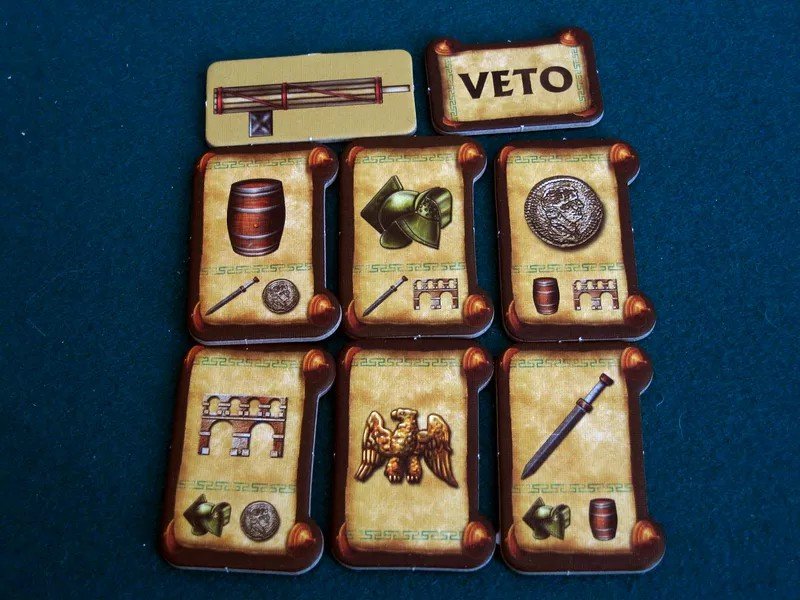
I speak of strategy, because each Agenda grants an advantage for those who won them (represented by the bigger icon on the Agenda), but each Agenda always goes in conflict with 2 other Agendas (represented by the smaller icons on the Agenda), which means, be careful to not bring to yourself conflicting Agendas, because that will make you lose the Agendas that go in conflict with that particular Agenda.
But this is where Senator shines! You can win a vote in the Senate, win that Agenda, use your advantage and then send that conflicting Agenda to one of your opponents. Oh, the Senate, full of surprises!
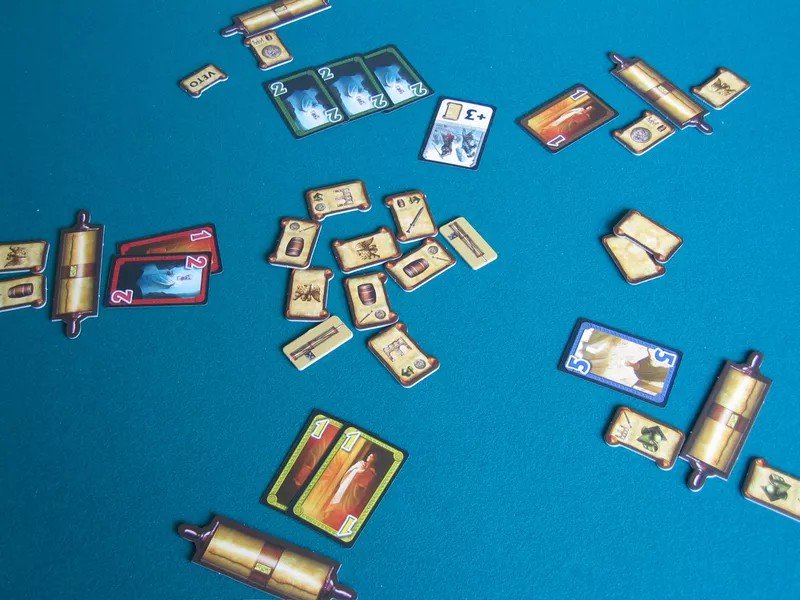
But conflicts don't end there; if what is in question (voting) is a Consul's support, the game gets ugly very quickly. I say that, because when you win (or get) an Agenda, it is placed on top of your Scroll (individual board) which states that: Agendas that are on top of your Scrolls can get punished and be lost because of conflicting Agendas, but the ones below the Scroll will be protected. And guess who helps you protect your Agendas? Yes, it's the Consul. That's why, when it goes to voting, everyone starts screaming.
Do you think that's it? Debating in the Senate isn't for the faint of heart! There is one Agenda in particular that grants you Veto power, which means, when someone pushes a conflicting Agenda onto you, you can veto its effects, but be careful, because after you use your Veto power, it will return to the Schedule and be available. In this case, this famous accolade is perfect: "Use it wisely".
It is obvious that each Agenda has a very good ability, but this one in particular is very coveted, and only loses to the Consul in that sense. Other Agendas also give you good abilities, such as retrieving Influence Cards, removing Agendas from the Schedule, disabling a Consul, giving your opponents conflicting Agendas, and there are Agendas that go straight to your Scroll's bottom part, which means, they are already protected, and so on and so forth. Many important things are addressed in the Senate's Schedule. This is the Roman Senate!
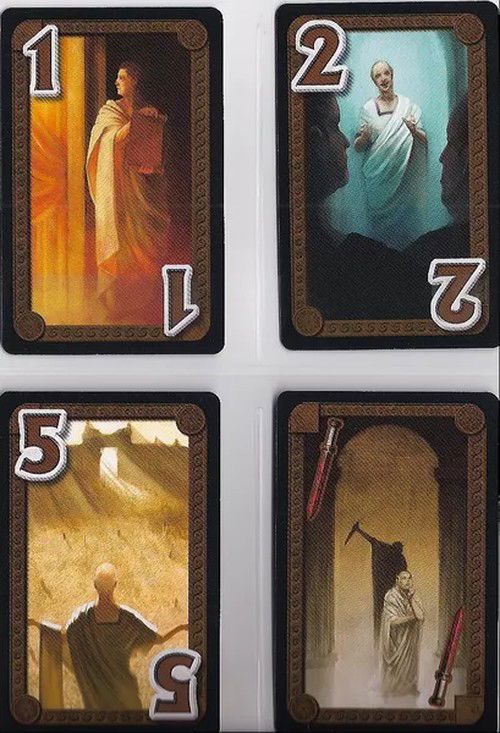
Do you think it's over? The Senate's political moves will surprise you again. If you notice everything is looking bad, you don't have any Influence Cards, important Agendas are being voted, many players around you have too much money and power in their hands, there's only one thing to do: send an Assassin and end it all! The Agenda is lost, votes are lost, and voting powers are also lost. This is a resource that should be used very strategically, because you can only count with an Assassin once per turn. But it is a very precise move.
When the Debate is over, be it because there are no more Agendas left or Consuls, or voting powers (Influence Cards), the Debate ends, and it's time to clean house!
Cleaning House
After many frenzied arguments are made during the Debate, and even assassinations, it is time to clean the Senate.
Players recall their Influence Cards, which grant them voting power. Any leftover Agenda should be sent to the Dock and shuffled again.
Like so, with a "clean" Senate, you can once gain prepare a new Schedule.
This is a Senator turn!
End of the Match and Scores
The match ends after the 3rd turn is finished.
The scores are added like so:
It is that simple!
Strategy Tips
Senator is the right game for great strategy tips, and I say this because the game brings us to it. Players need to have a good strategy, bluffs, and their choices really matter a lot, for instance, if you count the cards and end the Debate at the right time, it will make all the difference in the world. Let's look further!
Being the first player to play in Senator is essential, and it is highly strategic. The first player can be more reactive to the Events that take over the Debates, besides being the person who will choose the Agenda that will go into Debate, which means, they'll choose what will be contested.
When you choose an Agenda, you can choose an Agenda that goes in conflict with other players' Agendas, and because of that, two things can happen:
Both cases are good for the first player because, they'll either easily win the Agenda, or force their opponents to spend their Influence Cards.
I strongly suggest that, any time you start a Debate, you start with a low value to "feel" if other players' are as interested in those Agendas as you are. The exception is if you want that Agenda at all costs, because then the other option is to pay the price and risk having an Assassin in that Debate.
When there is a very interesting Agenda for one or more players, bluffing is always a suitable option. Increasing values to feign interest and force your opponents to spend their best Influence Cards is a magnificent strategy. Show them you're confident and interested in that Agenda, because it usually works and, later on, whoever acquired it ends up not having enough resources for other things.
Another thing that really works in Senator is counting cards - this is definitely a game in which this strategy works. Knowing which Influence Cards other players have played really helps you when it's time to contest Agendas, and gives you a gigantic advantage. Just don't fall into the trap of "thinking out loud" and start announcing to everyone what a player has or not spent.
And last, but not least, use your Assassin at the right time! It ends the Debate and everyone loses their Influence Cards. Let's see the best times to use it:
Senator shines when it comes to strategy, and this will make you enjoy its whole thought-intensive potential!
Rules Videos and How to Play
Check out the video with the Senator review, components and rules:
Check out a "how to play" (with no further details) in less than 2 minutes:
Play and Learn
Senator is a history lesson on its own. Its design, how it is played, its goals and objectives, and how all of this impacted history makes us understand a lot. Senator brings this to the game very well; the pertinent matters of the time, the way it was all done, etc... In the end, in Senator, one thing rings true: "learn as you play"!
Your strategic thought process will be tested at all times, and you'll have to know exactly the best moment to spend, or not, your Influence Cards when it's time to vote the Agendas.
Math is also used here a lot when it's time to count cards, or even count their values, as you can only play Influence Cards with values higher than the last opponent, if you want to win an Agenda.
Pedagogically, bluffing wouldn't be the best way to call this ability, but knowing exactly when to show interest in something or not is a very important ability in Senator, so I would call it emotional control.
Senator has a lot to teach us and entertain us!
I strongly recommend Senator for your collection!!!














— Комментарии 0
, Реакции 1
Прокомментируйте первым